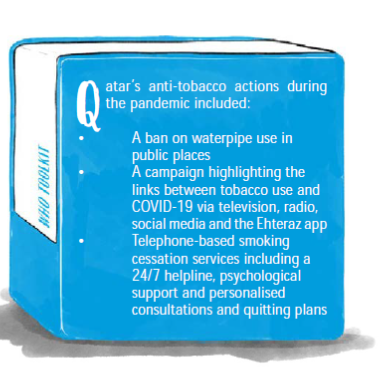World Health Organization. Regional Office for the Eastern Mediterranean
Improving service provision for people living with NCDs in occupied Palestinian territory: Lessons from the COVID-19 pandemic
04 Oct 2023
World Health Organization. Regional Office for the Eastern Mediterranean | 10 Sep 2023
Surveillance systems, such as the Death Registry, are key to Qatar’s success in tackling noncommunicable diseases (NCDs). These systems not only drive evidence-based policy decisions, but also measure the success of those policies. This has allowed Qatar to make significant progress across a wide range of NCDs and their risk factors,even during the COVID-19 pandemic.
 Telephone and online mental health services have been a lifeline for those living with mental health conditions during the pandemic, ensuring continued access to professional support.
Telephone and online mental health services have been a lifeline for those living with mental health conditions during the pandemic, ensuring continued access to professional support.
In 2020, Qatar conducted a Mental Health Attitudes and Awareness Survey, which has helped the Ministry of Public Health and key stakeholders to develop mental health awareness strategies. The Ministry of Public Health fast-tracked digital health services to ensure NCD patients got the care they needed from home without the risk of getting COVID-19 during in-person consultations.
Qatar’s tobacco control initiatives include a comprehensive advertising ban, health warnings on packaging, monitoring tobacco use and ratifying the Protocol to Eliminate Illicit Trade in Tobacco Products.
The Qatar Dietary Guidelines from 2016 encouraged people to “eat healthy while protecting the environment”, placing emphasis on a plant-based diet, sustainability and water conservation.
The Ministry of Public Health collaborated with Hamad Medical Corporation, Primary Health Care Corporation and others to implement digital health services to ensure the safe continuity of NCD treatment during the pandemic.
These services have worked effectively, and Qatar is expanding video consultations to include more services and specialists so that more people can access treatment.
Qatar set up its Death Registry to provide complete, accurate, and continuous data on the mortality statistics of the population. This data is critical to formulating policies and programmes to reduce premature mortality.
The Ministry of Public Health and WHO have offered training courses to health care professionals in using the mortuary management system and correct reporting of the information required by the Registry.
The Death Registry has shown that diseases of the circulatory system (high blood pressure, diabetes and high cholesterol) are responsible for the majority of deaths in Qatar. This information has shaped policies on tobacco consumption laws, tax increases on energy drinks and screening for diabetes and cardiovascular diseases.
In July 2004, Qatar was the first country of the Gulf Cooperation Council to ratify the WHO Framework Convention on Tobacco Control. Qatar immediately followed Global Tobacco Surveillance System recommendations to start a systematic surveillance programme for monitoring tobacco use. Using the Global Youth Tobacco Survey, Global Adult Tobacco Survey, and the STEPS NCD risk factors survey over the last 16 years has shown the clear landscape of tobacco use in Qatar and has informed the country’s tobacco control policies.
These policies have included:
The effectiveness of these interventions will continue to be measured over time, as the Global Adult Tobacco Survey and STEPS are being conducted every five years to continue this evidence-led approach.
Mental health services are at the heart of Qatar’s National Health Strategy (2018-2022). Given the stigma in the country surrounding mental health and the historic low levels of public awareness on the subject, the Ministry of Public Health developed the Qatar Mental Health Attitudes and Awareness Index to gain an accurate understanding of the attitudes and awareness to mental health in Qatar.
The plan is for this survey to be carried out every two years, measuring the effectiveness of activities aimed at increasing mental health awareness and reducing stigma. It also helps the country to develop future awareness strategies. The first two rounds of the survey show that there has been a shift towards greater acceptance and understanding of mental illness in Qatar, especially among younger people.
As COVID-19 hit the country, the Ministry of Public Health set up a psychiatry helpline, staffed by a team of mental health professionals who assessed callers and provided support. Callers were offered: triaging to assess needs; psychological support; referral to specialized psychiatric services and home delivery of medication. The Ministry also launched online mental health awareness campaigns via social media and dedicated websites. These provided information on how to seek help, and tips for mental well-being during the pandemic.
As a result of the helpline’s success, the Ministry plans to integrate telephone psychiatric services into future mental health services.
This country story is part of a series on sharing successful strategies from the Eastern Mediterranean Region mitigating noncommunicable diseases and mental health disorders during the COVID-19 pandemic and beyond. Discover additional stories and insights in the full report published by the World Health Organization Regional Office for the Eastern Mediterranean.